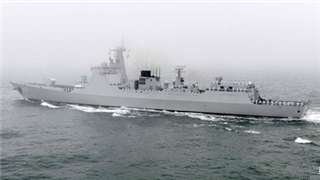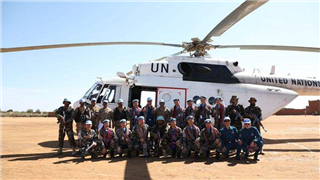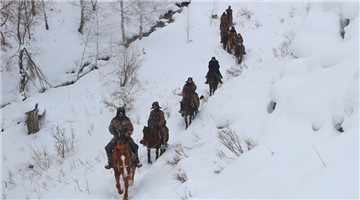BEIJING, Feb. 28 (Xinhua) -- When asked about his present daily life in China, John Darwin Van Fleet, an American scholar who has lived in Shanghai for around 20 years, said despite the COVID-19 outbreak, he can enjoy walking around his neighborhood as spring is now around the corner.
Living with his wife in another southern Chinese city of Shenzhen bordering Hong Kong, 75-year-old Roland Delcourt, a Belgian who has been closely following China's fight against the virus, also shares solidarity with the Chinese people in the face of adversity.
Though in different cities and with different backgrounds, they have common interests in observing the Asian giant's anti-coronavirus fight, offer the same support for the Chinese people and share similar concerns about the unjustified fear and xenophobia fueled amid the epidemic.
In Shenzhen, Delcourt is amazed by the fact that his neighbors are fighting the virus by staying at home, which, in his eyes, shows true solidarity.
"Some choose not to step outside out of fear of contamination, but most people in Shenzhen knows deep down that avoiding contacts is the first thing to do in order to stop the virus from spreading," the Belgian senior said.
Rather than stay at home, he decided to pitch in. He offered to do the groceries for his neighbors, including a couple who quarantined themselves at home after coming back from Wuhan, the epicenter of the epidemic.
"My wife and I bought the groceries for the family and our frail neighbors who might take risks just by going out. But soon, the community took over and I'm relieved that the couple are now in good hands," Delcourt said.
Like many foreigners, he said he was amazed by the fact that two hospitals were built from scratch and went into operation within two weeks.
"What makes me proud of China is that tens of thousands of doctors and nurses rushed to help out their colleagues in the martyred city of Wuhan," Delcourt said, paying his tribute to the medical staff at the front line.
"The enthusiasm of the medical workers, the courage, the will and the self-sacrifice shown by the front-line medical staff have earned admiration throughout China and abroad," he added.
In a letter to his family on the other side of the Pacific, Van Fleet shared with them a touching story in Wuhan.
"The quarantined city residents are opening up their windows at night, in high-rise complexes and such, and shouting encouragement to each other, across the compounds, across the neighborhoods," he wrote. "They're shouting, 'Wuhan Jiayou!', which is like 'C'mon Wuhan, you can do it!' or 'Stay strong, Wuhan!'"
For Van Fleet, the words of the late U.S. president Franklin D. Roosevelt -- "the only thing we have to fear is fear itself" -- seem so spot-on especially in the time when fear, scapegoating and xenophobic stupidity, once again, get amplified between lines of some news coverage and on social media.
"But Roosevelt's fear rages on, and will probably kill, directly or indirectly, many more people than the virus ever will," reads the letter of Van Fleet addressed to his family in Los Angeles.
He then referred to the 9/11 tragedy. "The fear the terrorists caused killed more people than died on the day."
As the metropolitan city of Shanghai, with 276 COVID-19 cases cured out of 337 confirmed cases as of Thursday, is seeing a sign of returning to normal, Van Fleet, who works at Shanghai Jiaotong University, embarked upon the online teaching like most of the Chinese educators.
"One thing I like to do is taking a daily walk, to meet people in shops and on the street, and take pictures of life in Shanghai slowly returning to normal," said the American professor.
A local "baozi" (stuffed bun) shop is one of his favorite stops, where he takes a special interest in observing the queue of customers waiting for their turn.
"In my experience, this queue (in front of the shop) is now about the usual length for mid-day during the week. I've joked with a few friends that perhaps we can construct a 'baozi shop indicator,' as an on-the-street metric indicating how rapidly the city is recovering its cosmopolitan life."
"Weiji," or "crisis" in English, is one of Van Fleet's favorite Chinese characters, because for him, the Chinese word contains both danger and opportunity.
"As far as the opportunities being part of the crisis, yes, I've seen opportunities in China, mostly in sanitary system, online education and remote working," he said.











